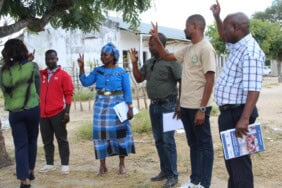Social-Emotional Learning to Enhance Classroom Performance
July 17th, 2024 | Stories
Teachers practice personalized greetings with each other during the training. Credit: Felix Da Esperanca Filipe, Communications Coordinator, SABER
The USAID-funded SABER bilingual education program in Mozambique improves learning experiences by supporting the well-being of teachers and students. The program is piloting Social-Emotional Learning (SEL) interventions in ten schools to improve pedagogical practices and create nurturing learning environments, which can lead to increased attendance and better learning outcomes.
Through SEL activities, people can build the awareness and skills necessary for healthy development, like self- and social awareness, emotional regulation, and decision-making. Research shows that SEL improves learning outcomes, decreases teacher burnout, and promotes individual and collective well-being.
The SABER team developed a manual with simple and effective SEL routines for teachers and school directors to use in classrooms. These routines include pedagogical practices to encourage group activities such as think-pair-share. In this activity, students consider a question individually, talk about it with another student, and then share their thoughts with the full class. Other student practices include daily individual journal reflections. Routines also focus on teacher-student relationships. Teachers are encouraged to call students by their names and use a personal greeting at the start of each day.

Teachers use the finger assessment to share their emotional states with the facilitator. Credit: Felix Da Esperanca Filipe, Communications Coordinator, SABER
In May, a SEL expert trained SABER staff and district and provincial education specialists from Serviço Distrital de Educação Juventude e Tecnologia (SDEJT) on SEL and how to lead teacher training. In June, these staff and specialists provided a two-day training on SEL routines for teachers from the ten pilot schools.
“I first heard about [SEL] through the invitation to participate in this training. Today, I noticed that everyone in my class is enjoying it. It will be great to apply the knowledge in the classroom”, said Jordão Sebastião from Naivelo Primary School in Namaita.
The SABER team designed a research study to monitor the effectiveness of the pilot and inform potential scale-up in 2025. The study will:
Before the pilot began, the team conducted a baseline assessment. Working with SDEJT, the team collected quantitative and qualitative data using a combination of classroom observations, Annual Status of Education Report (ASER) assessments, questionnaires, and focus group discussions.
Over the next five months, SABER will monitor teacher and student attendance rates and conduct monthly classroom observations. In November, the program will organize an end line assessment to evaluate the pilot. Stay tuned for the outcomes of this study, and read more about the teachers and students committed to education in Mozambique.
World Education fosters enduring partnerships across regions and sectors to advance education outcomes for all. We offer education systems strengthening, program design and implementation, applied research and evaluation, capacity development, and policy development services.